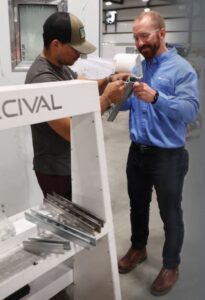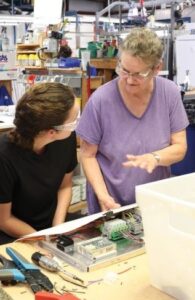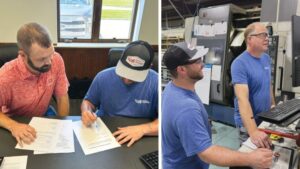
While language classes are not among the range of services CIRAS offers, its guidance on workforce strategies inspired Jake Oakland, president of Percival Scientific in Perry, to learn Spanish.
It is part of an effort to connect with Percival employees and the larger Perry community, where individuals of Hispanic, Latino, or Spanish origin account for nearly a third of the city’s population. CIRAS is assisting Percival with workforce planning, focusing on inclusive recruitment and retention practices for a diverse talent pool.
Percival is among a growing number of manufacturers across Iowa that realize the need to take action to address their workforce challenges. “Iowa’s population growth, especially in rural areas, is not keeping pace with business needs,” said Brenda Martin, CIRAS workforce services director.
Martin explained, “Demographic trends challenge businesses, with baby boomer retirements intensifying this. A multifaceted approach is needed. Companies must develop strategies to retain employees past age 65 and tap into the talent pipeline early—not just high school seniors.”
Building Intercultural Skills
Mayra Ramirez, a CIRAS project manager, worked with Percival’s leadership to develop a strategy to ensure that everybody has an opportunity to thrive at Percival. Iowa State University Extension and Outreach Community and Economic Development also supported the project.
”I have a general belief that diversity is an advantage,” said Oakland. “We have Hispanic representation, but we have opportunities to improve. One opportunity was to get more involved in Perry. We want our brand out in the community.”
Oakland has established a connection with Perry’s Hispanics United Group and plans for a member of the Percival staff to join the organization.
“You want people to understand who you are in your community, beyond just that building they drive by every day,” said Martin, “Don’t be a mystery, but be a place that people think would be a great place for their kids to work someday.”
Working with Ramirez, Percival conducted an intercultural awareness leadership training program and plans to offer the program to the rest of the company’s staff.
The company is also exploring Spanish translations for training and HR materials.
“Working with CIRAS has helped us evaluate how we support a diverse workforce,” Oakland said. “I am trying to learn Spanish and make it a point to speak some Spanish to employees who I know are bilingual. I hope it shows that we are open-minded and supportive.”

HR Focus
In early-stage businesses, one major challenge is taking the leap to build formal HR capabilities. Though Brandon Dahms’ expertise is in business management and international marketing, he recently added human resources manager to his responsibilities.
“Any questions our employees have usually come to me,” said Dahms, owner and sales manager for Innovative Manufacturing & Engineering in Des Moines. “It makes sense as a small, growing company we have someone in an HR role.”
Currently, the company has eight employees, but Innovative Manufacturing & Engineering is growing and expects to double its workforce over the next three years.
With assistance from CIRAS, Dahms improved human resources processes, introducing an onboarding checklist and updating the employee handbook to support new hires in reaching milestones.
“Coaching helped me learn to create a priority list. Before this, we just threw stuff at the wall to see what stuck. We did not have much direction,” Dahms said. “We now have a consistent process.”
Building the Technical Talent Pipeline
Jeff Goodwin, president of JEDA Polymers in Dyersville, wanted a student intern to help set up an inventory tracking system. He started looking for an industrial engineering student. While waiting for a response, CIRAS helped him rethink the details.
Ramirez suggested expanding the search to encompass all engineering and business students, increasing the applicant pool. CIRAS also helped JEDA develop a more detailed job posting, interview questions, and a candidate evaluation matrix. Ramirez even assisted in finding housing and helped JEDA secure a grant through the Iowa Student Internship Program, funded by Iowa Workforce Development. Goodwin eventually hired a supply chain management student.

Engineering, goes over onboarding documents with an employee. Right: Employees at Innovative Manufacturing & Engineering review production plans.
In a workforce-constrained operation, it is critical to make sure that your employees have the tools to do their work efficiently. JEDA was concerned that they did not have enough spare parts to support their team operations. “We have a good handle on raw materials but not spare parts and maintenance items. If something breaks down, it can cause downtime that costs a lot of money,” he said.
Collaborating with Emily Betz, CIRAS project manager, JEDA implemented a Kanban inventory system, including an instruction manual.
“Mayra helped me considerably with this process,” Goodwin said. “I don’t think I could have done it without her.”
In a workforce-constrained world, businesses need to rethink details that have become a standard to open recruiting pools, improve new-hire and long-term retention, and develop leaders. Strategic adjustments to how things are done can make a substantial difference.
“We want our clients to work toward being an employer of choice,” said Martin. “It’s hard, and we’re here to help companies be more strategic.”
For more information, contact Brenda Martin at bkmartin@iastate.edu or 515-570-5282.